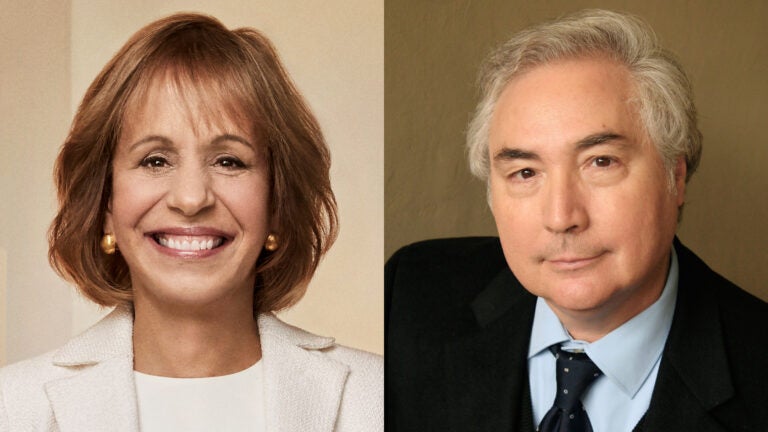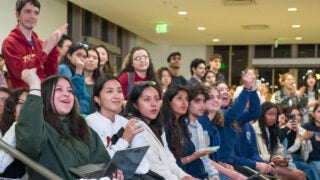
USC President Carol Folt and USC Annenberg Professor Manuel Castells have been elected to the American Academy of Arts & Sciences. (USC Photos)
Carol Folt, Manuel Castells elected to American Academy of Arts & Sciences
USC President Folt and USC Annenberg’s Castells join the prestigious organization, which recognizes excellence in academia, the arts, industry, policy, research and science.
USC President Carol Folt and Professor Manuel Castells of the USC Annenberg School for Communication and Journalism have been elected to the American Academy of Arts & Sciences, one of the nation’s oldest honorific societies. The prestigious honor recognizes excellence in academia, the arts, industry, policy, research and science.
Folt and Castells are among the 250 members elected this year, including luminaries such as actor, director and producer George Clooney, recognized for his work with the Clooney Foundation for Justice and Smokehouse Pictures, and Apple CEO Tim Cook. Author and English professor Jhumpa Lahiri of Barnard College and developmental psychologist Megan Bang of Northwestern University are just two of the notable academicians elected in 31 areas of expertise.
“We honor these artists, scholars, scientists and leaders in the public, non-profit and private sectors for their accomplishments and for the curiosity, creativity and courage required to reach new heights,” said David Oxtoby, president of the academy.
The academy, founded in 1780, serves as a research center convening leaders from across disciplines, professions and perspectives to address significant challenges and recognizes and celebrates the excellence of its diverse members. Previously elected academy members include Benjamin Franklin (elected 1781), Alexander Hamilton (1791), Ralph Waldo Emerson (1864), Margaret Mead (1948), the Rev. Martin Luther King Jr. (1966), Madeleine K. Albright (2001) and Anna Deavere Smith (2019).
Carol Folt
Since joining USC in 2019 as the university’s 12th president, Folt has led bold initiatives that reflect her long-held student-centered approach. She eliminated tuition for students whose families earn $80,000 or less annually and opened the USC School of Advanced Computing, USC’s first new school in more than a decade. Under her leadership, applications for USC admission have surged to record numbers, and the university’s research grants surpassed $1 billion for the first time.
Folt has introduced a series of ambitious “moonshot” goals to promote intercampus collaboration. These include expanding and enhancing the health sciences, advanced computing, student and faculty investment, sustainability, athletics and the arts. Among the initiatives are the $1 billion Frontiers of Computing initiative, which infuses advanced computing throughout the university’s programs and curriculum with ethics at its core, and Assignment: Earth, a comprehensive sustainability agenda to achieve carbon neutrality for the university by 2025 and zero waste by 2028 as well as research and policy leadership.
Under Folt’s direction, USC has also unveiled new facilities that foster alliances across USC’s 23 schools and academic units, including the USC Capital Campus in Washington, D.C., and expanded cultural and resource centers for students.
“It is an honor to be elected to the AAAS and included among some of the greatest scholars, innovators and creators of our time,” Folt said. “Since 1780, the academy has been on a mission to promote excellence and do good by bringing together artists and scientists from diverse disciplines. As a life scientist and academic leader, this resonates deeply with me and I see so much promise in our students who will further this mission in the generations to come.”
Before coming to USC, Folt served as chancellor of the University of North Carolina at Chapel Hill. She previously held several leadership positions at Dartmouth College, including interim president, provost, dean of faculty and professor of biological sciences. She served as chair of the Association of American Universities Board of Directors from October 2022 to October 2023.
An internationally recognized environmental scientist, Folt has USC faculty appointments in biological sciences, civil and environmental engineering, and population and public health sciences, and holds the Robert C. Packard President’s Chair.
After attending community college — a point of pride for Folt, who has committed to expanding financial aid for USC’s transfer students — she earned her bachelor’s degree in aquatic biology and a master’s degree in biology from the University of California, Santa Barbara, and her doctorate in ecology from the University of California, Davis.
Manuel Castells
Manuel Castells is University Professor and Wallis Annenberg Chair in Communication Technology and Society at USC Annenberg.
The author of 35 books focusing mainly on how information and digital technology affect human lives and societies, Castells is the world’s foremost-cited communication scholar and a leading researcher on globalization, networks and internet studies. His groundbreaking trilogy, The Information Age, is widely regarded as the seminal work in understanding societal change in the wake of the digital revolution. His most recent book, Advanced Introduction toDigital Society, was published in June.
“The reward for my work that really matters for me is the appreciation of my students and of my colleagues. and so, because this is a collegial distinction, I feel honored and humbled,” Castells said.
Among many honors, Castells earned the Norwegian government’s 2012 Holberg Prize, which lauded him for having defined “our understanding of the political dynamics of urban and global economies in the network society.” He also received the prestigious Balzan Prize in 2013. He has served as Spain’s minister of universities, overseeing policymaking for the country’s 88 public and private universities.
Castells holds joint appointments in the USC Price School of Public Policy and the USC Dornsife College of Letters, Arts and Sciences’ Department of Sociology and Department of Political Science and International Relations. He is also professor emeritus at University of California, Berkeley, where he was professor of city and regional planning and professor of sociology from 1979 to 2003 before joining USC.



